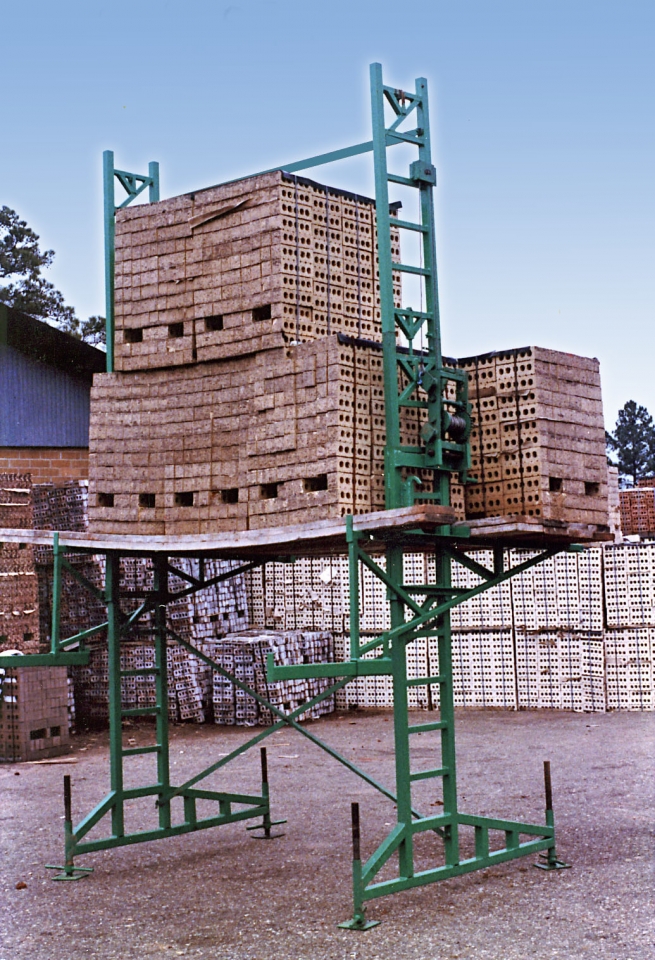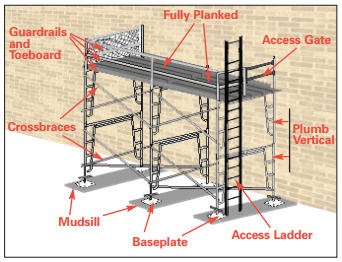Exploring the Numerous Kinds Of Scaffolding Utilized in Building Projects
The construction sector counts greatly on numerous kinds of scaffolding to meet details task demands, each offering distinctive benefits and applications. Standard structure scaffolding offers a tough foundation for general jobs, while suspended scaffolding is essential for job on high-rise structures.

Typical Framework Scaffolding
Conventional framework scaffolding is among the most extensively used methods in the construction market as a result of its toughness and adaptability. This system contains upright and horizontal frames that are set up to create a secure system for employees and products. The main parts consist of upright articles, horizontal ledgers, and angled dental braces, which with each other offer a solid structure that can support substantial tons.
Among the key benefits of standard structure scaffolding is its flexibility to various construction projects, varying from domestic structures to big commercial frameworks. The modular design enables very easy assembly and disassembly, making it reliable for both long-term and short-term tasks. Furthermore, the system can be personalized in height and width, suiting different structure styles and website problems.
Safety is vital in scaffolding applications, and conventional structure systems are equipped with guardrails and toe boards to stop drops and make certain employee security. Normal examinations and adherence to safety policies are vital in keeping the honesty of the scaffold (Scaffolding). Generally, standard structure scaffolding continues to be an essential selection in the construction industry, giving a reliable platform for labor and improving general job performance

Suspended Scaffolding
Suspended scaffolding offers an one-of-a-kind option for building projects that call for access to raised surfaces, particularly in circumstances where conventional structure scaffolding might be unwise. This kind of scaffolding is normally put on hold from the roofing system or upper degrees of a framework, utilizing a system of platforms, ropes, and wheels to produce a working room that can be adapted to various elevations.
One of the main advantages of put on hold scaffolding is its versatility. It can be conveniently repositioned or reduced to accommodate adjustments in building demands, making it ideal for jobs such as window setup, frontage work, and upkeep on skyscraper buildings. Furthermore, the very little impact of suspended scaffolding enables for far better usage of ground area in metropolitan settings, where space is frequently minimal.
Safety is a critical consideration in the usage of put on hold scaffolding. In general, put on hold scaffolding offers a reliable and reliable option for accessing hard-to-reach locations in various building situations, enhancing both productivity and security on site.
System Scaffolding
System scaffolding, usually pertained to as a contemporary remedy in the scaffolding market, consists of pre-engineered components that can be swiftly assembled and adjusted for different building projects. Scaffolding. This sort of scaffolding is identified by its modular style, which allows for convenience and performance on task sites, suiting various heights and structural needs
Generally made from high-strength steel or aluminum, system scaffolding uses boosted resilience and security. The elements consist of vertical posts, straight journals, and diagonal dental braces, which adjoin securely, making sure a robust framework. The design frequently incorporates standard fittings, simplifying setting up and disassembly procedures, consequently minimizing labor time and costs.

Rolling Scaffolding
Rolling scaffolding is a functional choice to typical fixed scaffolding, created for flexibility and convenience of usage on building and construction sites. This kind of scaffolding contains a platform sustained by structures with wheels, enabling employees to quickly relocate it as required. The mobility feature dramatically boosts performance, as it lessens downtime associated with assembling and disassembling repaired scaffolding.
Normally built from light-weight scaffolding und fading materials such as light weight aluminum or steel, rolling scaffolding supplies a sturdy yet mobile option for jobs requiring regular repositioning - Scaffolding. It is particularly useful in jobs such as painting, drywall installment, and electrical work, where access to numerous heights and locations is needed
Safety and security is critical in rolling scaffolding layout, with attributes such as securing wheels to avoid unintentional movement when in use, and guardrails to secure workers from drops. Additionally, lots of models are flexible in height, suiting various project needs.
Cantilever Scaffolding

The style of cantilever scaffolding usually includes using arms or brackets secured to a building or framework, making it possible for the system to prolong outside safely. Safety and security is extremely important; therefore, these scaffolds need to be engineered to endure various lots and environmental conditions. Regular evaluation and maintenance are vital to make certain structural stability and worker safety and security.
Cantilever scaffolding is favored for its flexibility and reliable usage of space, making it a preferred option in city atmospheres where space restraints prevail. It facilitates much easier accessibility to high altitudes, ultimately contributing to the total effectiveness of construction projects. Just like all scaffolding types, proper training and adherence to safety and security criteria are critical for workers making use of cantilever scaffolding.
Verdict
To conclude, you could try these out the diverse kinds of scaffolding made use of in building tasks each serve distinctive functions customized to specific site needs. Standard structure scaffolding offers stability, while put on hold scaffolding supplies versatility for elevated jobs. System scaffolding helps with quick assembly, and rolling scaffolding enhances wheelchair for differing work settings. Cantilever scaffolding effectively deals with challenges in metropolitan settings. Understanding these scaffolding types is crucial for optimizing safety and security and productivity in building, eventually additional resources adding to the successful conclusion of projects.
Typical structure scaffolding supplies a sturdy foundation for general tasks, while put on hold scaffolding is essential for job on skyscraper structures.Rolling scaffolding is a versatile alternative to standard fixed scaffolding, developed for movement and ease of usage on building and construction websites. As with all scaffolding types, appropriate training and adherence to security requirements are essential for workers making use of cantilever scaffolding.
Traditional frame scaffolding gives stability, while put on hold scaffolding provides flexibility for raised tasks. System scaffolding helps with quick setting up, and rolling scaffolding boosts wheelchair for varying job environments.